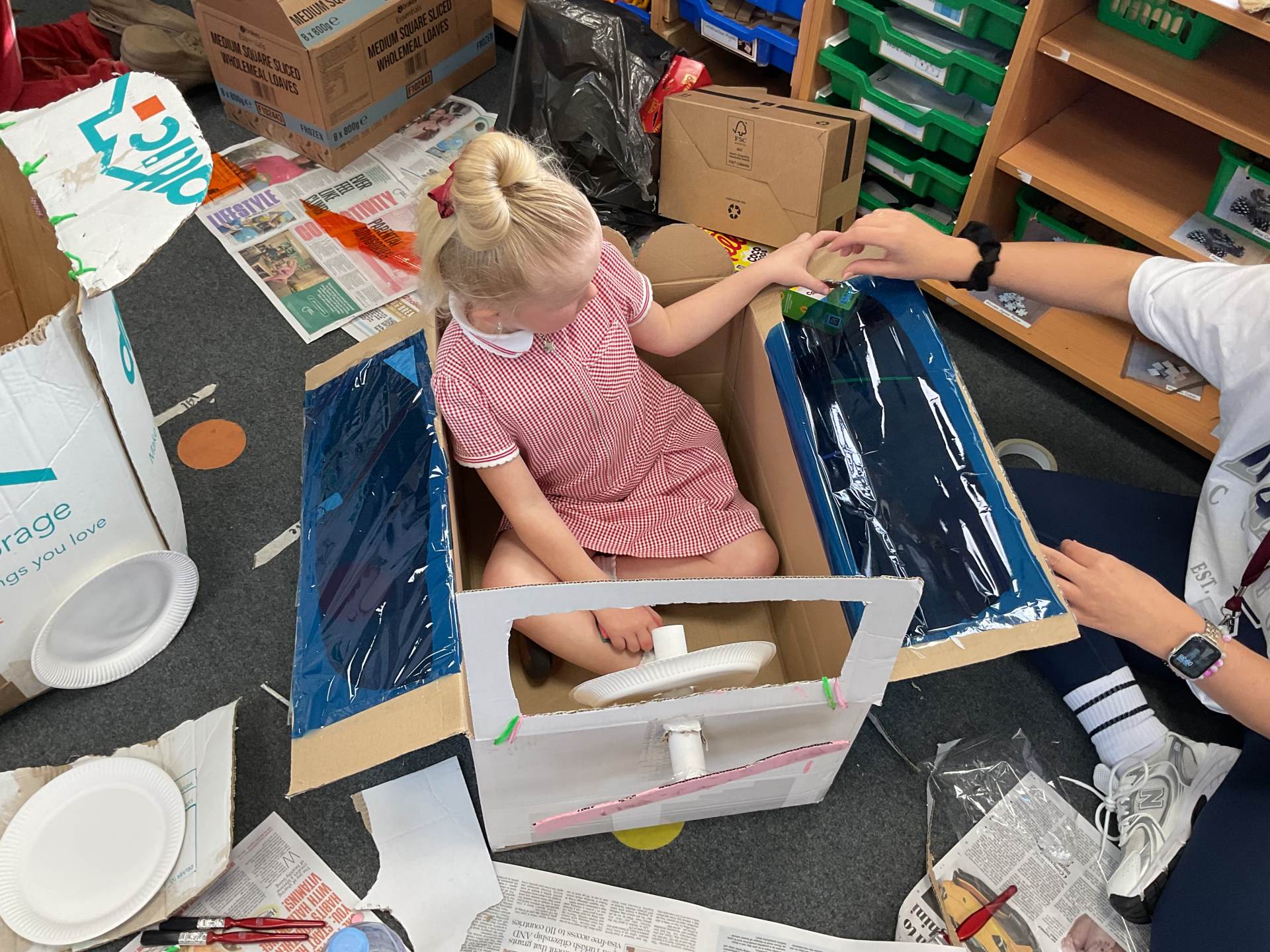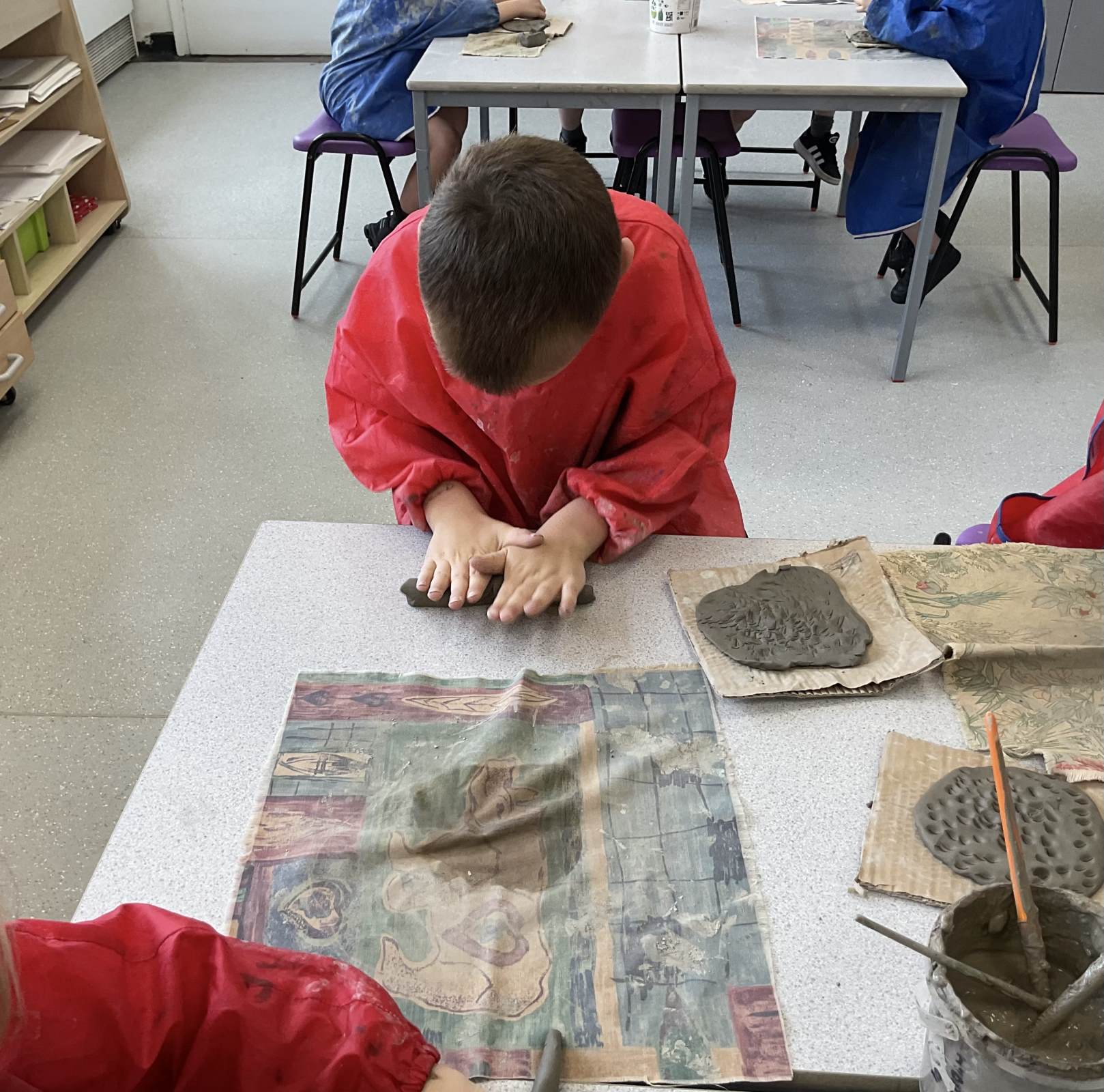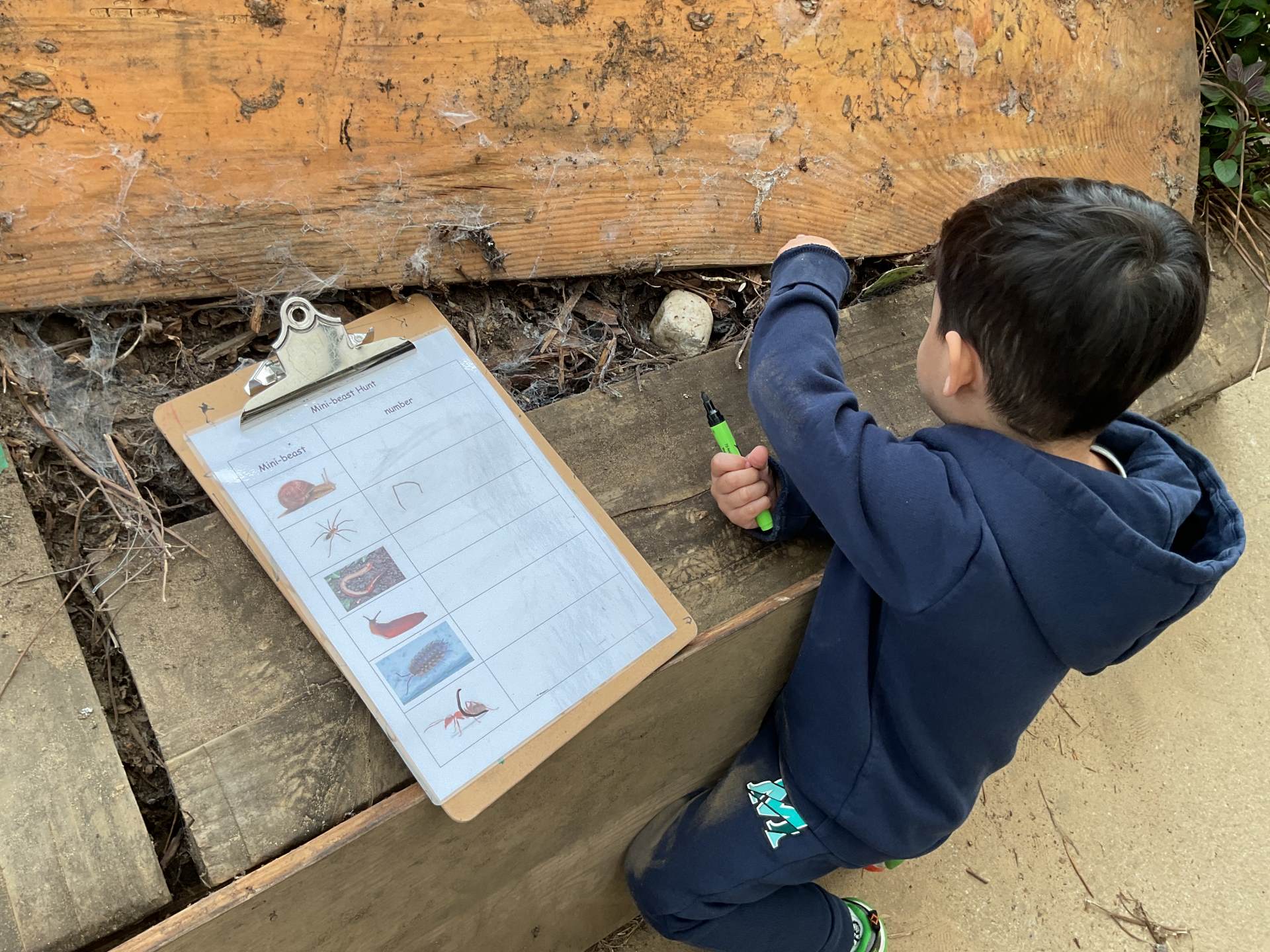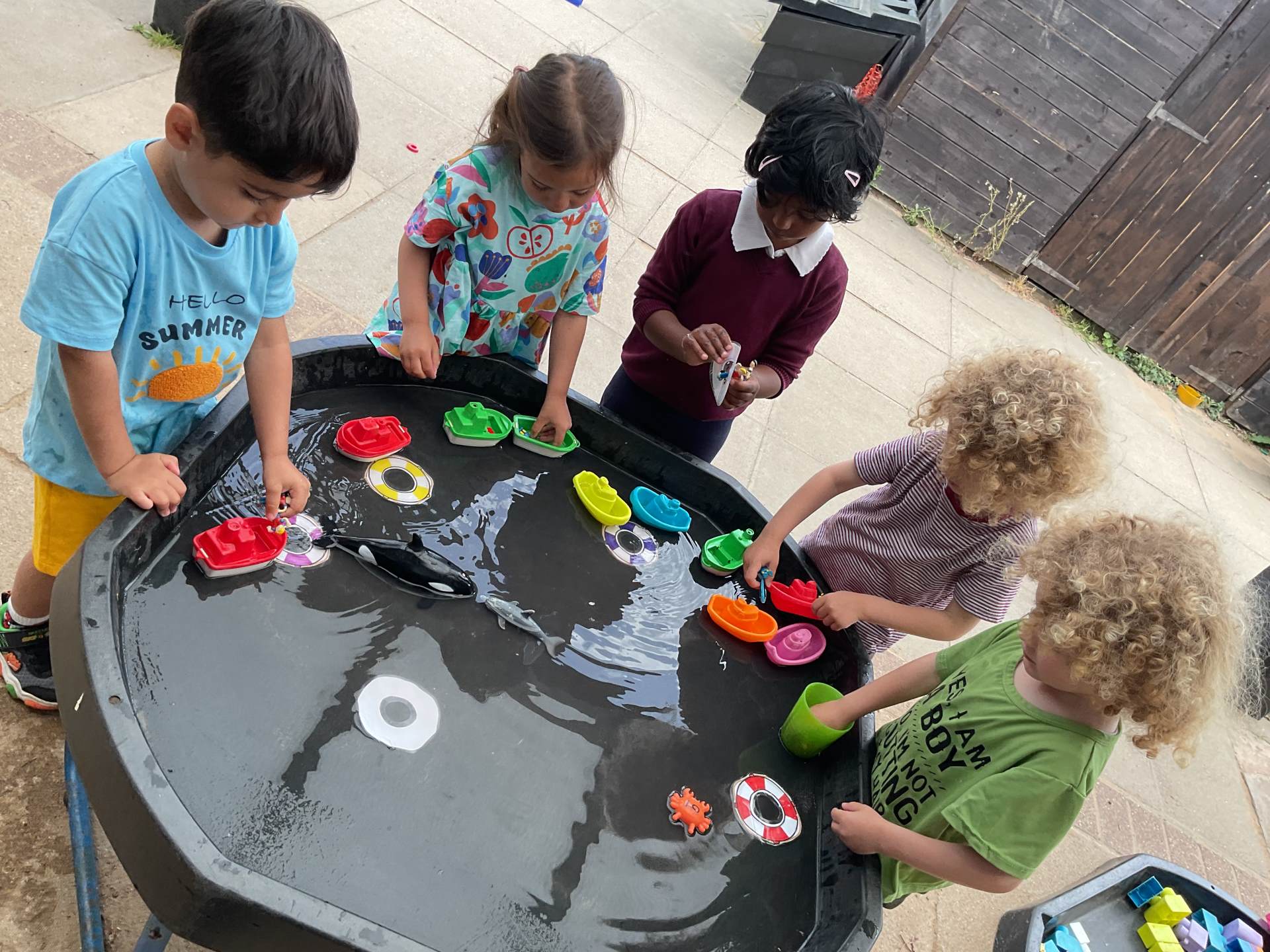EYFS
Intent
The Early Years Foundation Stage (EYFS) is crucial in securing solid foundations that our children continue to build upon. It is our intent that the children who enter our EYFS develop physically, verbally, cognitively and emotionally whilst embedding a positive attitude to school and learning. In EYFS we strongly believe that we are at the beginning of our children’s educational journey. We want our children to acquire a lifelong love of learning that not only readies them for the next stage of education but prepares them to be active and engaged citizens in the future.
We begin each new year by looking at the individual needs of our children and take into account their different starting points. We will then carefully develop our EYFS provision to ensure a broad and balanced curriculum that is suitable for their unique needs and sets ambitious expectations for all children.
Implementation
Our curriculum provides a play-based and experiential learning environment, combined with focussed teaching and basic skills, to ensure that children make rapid progress before entering Year 1.
We follow the Early Years Statutory Framework, provided by the Department of Education (DfE). The framework sets out the requirement for learning and development within the EYFS and focuses on the prime and specific areas. These are broken down into the areas:
Prime Areas
- Personal, Social and Emotional Development
- Communication and Language
- Physical development
Specific Areas
- Literacy
- Mathematics
- Understanding the World
- Expressive Arts and Design
In nursery the children work through the different areas of learning to prepare the children to become ‘school ready’. In Reception pupils work towards the Early Learning Goals of the Early Years Foundation Stage with the intention of being ready to move onto the National Curriculum Programmes of Study at the start of Year 1. Throughout this period and beyond children are still developing their listening skills, phonic knowledge and their fluency in reading through structured phonics teaching.
The delivery of the curriculum uses an integrated thematic approach where the 17 areas of learning and development are integrated into a theme, if appropriate, but also taught discretely where this might be more suitable to the circumstances. Throughout the year we have special days or weeks which have a clear focus, for example; Science Week, World Book Day and The Arts week. These are special events that enable children to put learning into practice in a variety of other situations.
We take pride in providing a highly inclusive environment, where learners of all abilities can demonstrate high levels of enjoyment in their education and many make good progress in their learning. Children at all levels of ability are helped to achieve their full potential. Through pupil progress analysis, those who learn rapidly are challenged and supported with tasks that provide opportunities to develop mastery. Our whole curriculum is developed around a continuous provision approach where opportunities and resources are provided to develop their learning through play. Those children who are presented with a barrier or are slower attainers are provided with target support through modified activities, small group focused work and additional interventions in order to embed skills. Examples of interventions provided are WELCOMM, precision monitoring and dough disco.
The Seesaw app is introduced to parents to keep them informed of important learning experiences that their child has in school. It allows parents to comment and share information back to the teachers to inform their assessments.
Impact
We strive to ensure that our children’s progress across the EYFS curriculum is good from their varied starting points. We also strive for children to reach the Early Learning Goals at the end of Reception and to be at least in line with National Expectations.
The impact of our curriculum is measured in Reception by assessment procedures which allow us to measure outcomes against all schools nationally. We measure the percentage of pupils achieving age related expectations throughout the academic year and will put supportive interventions in place if and when needed.
Class teachers use observations to make formative assessments which inform future planning and ensure that all children build on their current knowledge and skills at a good pace. Discussion between the well-trained staff of Teachers, Early Years Practitioners and Learning Support Assistants also supports the assessment procedure to ensure good development. Summative assessment compares children’s attainment to age related expectations. This is tracked using Arbor to ensure children are working at the expected standard, including vulnerable groups such as those with SEND, disadvantaged or EAL children. Our assessment judgements continue to be moderated both in school and externally with other local schools in our trust. We have also partaken in local authority moderation which has validated our school judgements, in line with the previous EYFS framework.
The impact of our curriculum will also be measured by how effectively it helps our pupils develop into well rounded individuals who embody our values and carry with them the knowledge, skills and attitudes which will make them lifelong learners and valuable future citizens. We endeavour for pupils to be School or Key Stage 1 ready and have our school values embedded by the time they leave reception, preparing them for their future.
Transitions
At The Alderton Infant School and Nursery we recognise that starting school and moving up classes has the potential to be a stressful time for both parents and children. To this end we have established a strong set of procedures for transitions to be as smooth as possible.
In the Summer Term before starting at our school all the children have a Stay and Play session in our Nursery and Reception settings to meet the EYFS staff and get familiar with their new surroundings. Parents attend this first session in school so that they are able to see the setting and the provision.
In Reception all children then have an Induction Session with their new teachers and teaching assistants, parents are invited to a ‘Coffee and Chat’ session in the hall with the Headteacher. Parents can find out information, ask questions and share information about their child. The EYFS leader will then visit the pre-school settings where many of our children come from. Where a visit is not possible a telephone conversation is arranged to share information about the child starting.
All children starting in our school have home visits before they start. This gives children the security of meeting with their teacher in a safe, familiar environment and gives parents time to ask questions and share knowledge or any concerns they have about their child.
In the Nursery parents are invited to stay for a short while during the first few days when children begin. All full time children have a staggered entry in September over 2-3 weeks in order to ensure that children who need extra support are given time to settle into the routines of school, a timetable will be sent to parents so that they are aware of the changes to the full time timetable.
In the summer term all our Reception children visit their new Year 1 teachers prior to them starting Year 1. Reception teachers pass on their knowledge of each child’s development, progress and achievement towards the early learning goals to ensure that all teachers have a well -rounded picture of the children prior to
starting the new school year.
Health and Safety and Safeguarding
Children learn best when they are healthy, safe and secure, when their individual needs are met, and when they have positive relationships with the adults caring for them. We follow the safeguarding and welfare requirements detailed in the ‘Keeping Children Safe in Education’ statutory guidance and adhere to the school’s safeguarding policy. We have annual in-house Level 2 safeguarding training for all members of staff. Staff are supported to understand the safeguarding policies and procedures to implement this training effectively. Staff are supported to understand our whistleblowing policy and take action when required. We have a Designated Safeguard Lead and 3 Deputy Designated Safeguarding Leads throughout the school.
To enhance child safety, we are required to follow up if a child is absent for a prolonged period of time. Additionally, we must hold additional emergency contact details for every child.
We are a healthy school and for the Reception children we provide the Universal Infant Free school meal
and the menu is regularly monitored with the Catering Manager. We cater for those children who have special dietary requirements and have robust systems in place ensuring that all children receive the correct meal.
Fresh water is readily available for all children and we encourage children to bring in water bottles with water only.
Milk is provided at lunchtime in Reception and throughout the day for the Nursery Children. All children are provided with a healthy snack throughout the day.
New requirements are in place to ensure safer eating. A crucial aspect of this is the requirement for a member of staff with Paediatric First Aid (PFA) certification to be present during mealtimes.
Children are taught the importance of keeping clean, brushing their teeth and washing their hands correctly as well as keeping healthy through a healthy lifestyle.
We are strengthening our EYFS safeguarding requirements to further enhance the safety and well-being of children in early years settings. The following amendments are now part of our policy, and we ensure our setting complies with these changes:
Children’s privacy during nappy changing and toileting is carefully considered and balanced with safeguarding considerations.
Early years students and trainees are now required to have Paediatric First Aid (PFA) training in order for them to be included in staff ratios at the level below their level of study.
We have clear procedures for Safer Recruitment. We complete the following processes:
- Provide and obtain references for all prospective staff members.
- Ensure your safeguarding policies include clear procedures to guarantee that only suitable individuals are recruited into our setting.









EYFS Policy
EYFS Parent Support guides
